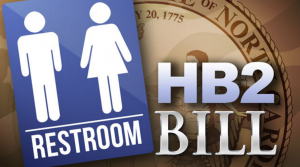
In the midst of the already tense political arena of modern America, members of the transgender community have been fighting for their right to use the public bathroom of the gender they identify with. Especially since North Carolina Governor Pat McCrory signed House Bill 2 into effect in March of this year. The controversial piece of legislation blocks transgender people from using the public bathroom that aligns with their gender identity. They must instead use the bathroom that corresponds with their biological sex. By not allowing members of the transgender community to choose, the government of North Carolina is overstepping the boundaries of their power. The issue of gender identity is purely a private issue and does not belong within the realm of public discourse, as it does not affect anyone other than the individual. It can be stated that, although gender identity is a private matter, the actions (choice of public bathroom) that result from it have a direct influence on the rest of society. This argument would be void of any truth to support its validity. Pat McCrory attempted to justify his support of the Bill using this reasoning by implying that tolerance of transgender bathroom rights would be equivalent to allowing men into women’s locker rooms. If there were significant evidence that cisgender men have used gender identity as a way to commit perverted acts, I could admit the validity of this claim. However, considering the lack of recorded cases of men using a false transgender identity as a way to gain access to female public bathrooms, this argument is purely based on assumption and therefore should remain in private discourse only.
In August following the passage of the North Carolina bill, the United States Supreme Court agreed to review a case (Gavin Grimm v. Gloucester County School Board) concerning a lower court decision that ruled in favor of a high school student’s right to use the bathroom that aligned with his gender identity. The supreme court blocked the original ruling on the case on the grounds that they needed to “preserve the status quo” of traditional bathroom use based on biological sex. By deciding to rule in favor of the status quo, the supreme court is oppressing the individuality of the high school student. Without the individuality of minorities – in this case, transgender individuals – new truths will not be discovered, we will become stagnant in our current practices, and society will miss the opportunity to become more well developed. The judges should have upheld the original ruling on the case so that the publicly accept definition of “normal” could have been challenged. Challenging “normal” would promote a healthy public discussion on the topic, and inevitably lead to a new and more developed understanding of truth. In the long run, this would have brought a greater benefit to society than leaving the status quo undisturbed.
